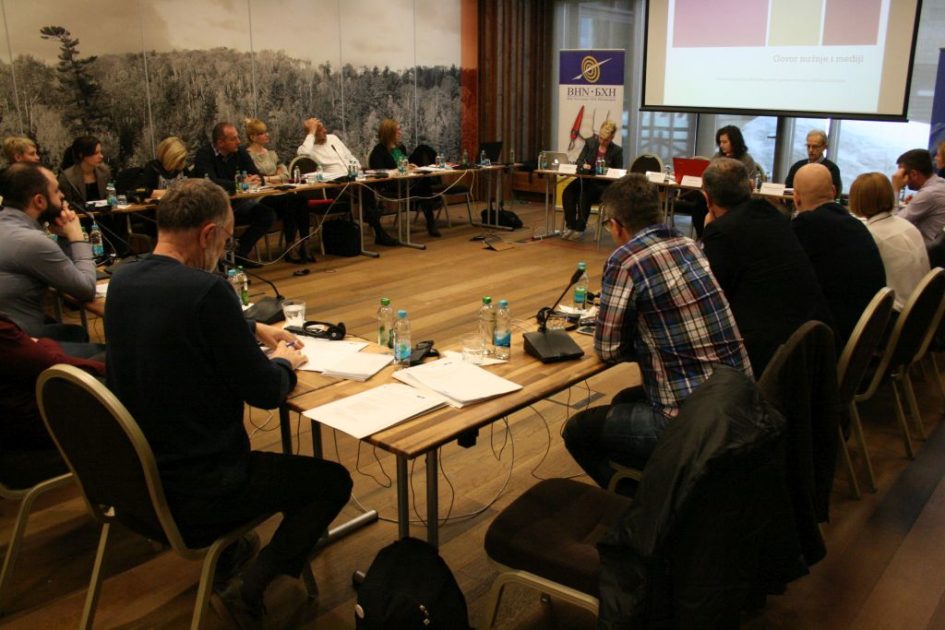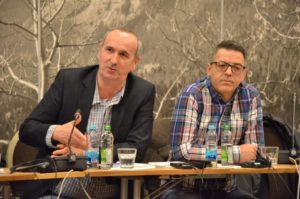 JAHORINA, 04.04.2018. -Media are required to inform the public on topics concerning hate speech, in a way that inappropriate speech is critically questioned and deconstructed in electronic media in BiH.. The application of professional international standards and norms of hate speech, as well as respecting journalistic codes and laws in creating programs is a precondition for defense of journalists and media from potential lawsuits in the courts, concluded the participants of the inter-professional round table, which was concluded today in Jahorina.
JAHORINA, 04.04.2018. -Media are required to inform the public on topics concerning hate speech, in a way that inappropriate speech is critically questioned and deconstructed in electronic media in BiH.. The application of professional international standards and norms of hate speech, as well as respecting journalistic codes and laws in creating programs is a precondition for defense of journalists and media from potential lawsuits in the courts, concluded the participants of the inter-professional round table, which was concluded today in Jahorina.
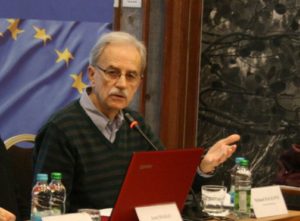 Mehmed Halilović a lawyer and a media expert said that discrimination and hate speech are closely linked, because they are stereotypes and prejudices. Noting that in BiH we do not have much expressed hate speech in the contents of traditional media, Halilović emphasized: “Hate speech has mostly moved to comments in the online sphere and most often has the dimension of national and religious intolerance.”
Mehmed Halilović a lawyer and a media expert said that discrimination and hate speech are closely linked, because they are stereotypes and prejudices. Noting that in BiH we do not have much expressed hate speech in the contents of traditional media, Halilović emphasized: “Hate speech has mostly moved to comments in the online sphere and most often has the dimension of national and religious intolerance.”
„It is important to distinguish between hate speech and what falls under freedom of expression and can be limited in legally prescribed exceptions“, said the judge of the Cantonal Court of Sarajevo Svjetlana Milišić-Veličkovski. Besides, there is a need to harmonize criminal laws at entity levels, that is, to amend the FBiH Criminal Code, modeled on the same law in RS that clearly defines hate speech and legal sanctions if it is transmitted through the media, the prosecutor of the Cantonal Prosecutor’s Office of Sarajevo Canton Sanin Bogunić.
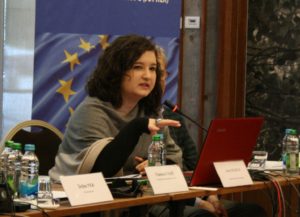 Representative of the Coalition Fighting Against Hate Speech in BiH, Vladana Vasic talked about the importance of monitoring media and reporting cases of hate speech to relevant institutions, such as the Regulatory Agency for Communications and judicial institutions, which is one of the Coalition’s activities.„In traditional and new media, the problem is journalistic content that has hate speech, especially if it is aimed at minority groups such as migrants and refugees, LGBT and women“, said Vasić and added that media need to be more critical towards hate speech in public space, publicly condemn it and mark it as inappropriate and sometimes even as a criminal offense.
Representative of the Coalition Fighting Against Hate Speech in BiH, Vladana Vasic talked about the importance of monitoring media and reporting cases of hate speech to relevant institutions, such as the Regulatory Agency for Communications and judicial institutions, which is one of the Coalition’s activities.„In traditional and new media, the problem is journalistic content that has hate speech, especially if it is aimed at minority groups such as migrants and refugees, LGBT and women“, said Vasić and added that media need to be more critical towards hate speech in public space, publicly condemn it and mark it as inappropriate and sometimes even as a criminal offense.
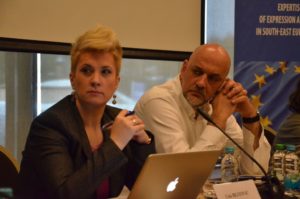 Federal Television is in the regulation of the program in accordance with the applicable laws as well as the internal codex that has existed for several years. According to Željko Tica, editor of the FTV news program, the only problem is the contact program in which viewers participate directly. “Before the viewer gets the opportunity to speak in the program, he needs to announce what he will ask and leave his number, which we call him to come to the program. There is still a chance for something unforeseen to happen, that a problematic statement goes into the ether, but the editor or journalist must react to this and condemn the inappropriate speech, “Tica pointed out.
Federal Television is in the regulation of the program in accordance with the applicable laws as well as the internal codex that has existed for several years. According to Željko Tica, editor of the FTV news program, the only problem is the contact program in which viewers participate directly. “Before the viewer gets the opportunity to speak in the program, he needs to announce what he will ask and leave his number, which we call him to come to the program. There is still a chance for something unforeseen to happen, that a problematic statement goes into the ether, but the editor or journalist must react to this and condemn the inappropriate speech, “Tica pointed out.
At the end of a two-day discussion attended by 30 representatives of electronic media regulators, public and private broadcasters, judges, prosecutors, lawyers, civil society activists and media experts, it was concluded that the media can contribute to the change of public communication, and it is necessary to insist on professional reporting and constant education of journalists and editors.
Besides, the need for reform of public services and the education system was also emphasized through the introduction of the subject of media literacy. It is also recommended to promote the fight against hate speech through public campaigns, as well as to tighten penalties for spreading hate speech in traditional and new media.
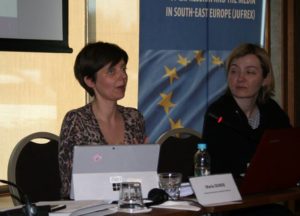 In the debate, the publication “Media Regulatory Authorities and Hate Speech“, which deals with hate speech in the electro media in the states of the Western Balkans, whose authors are experts in regulatory issues and experts from regulatory agencies from Albania, BiH, Croatia, Kosovo, Montenegro, Macedonia and Serbia.
In the debate, the publication “Media Regulatory Authorities and Hate Speech“, which deals with hate speech in the electro media in the states of the Western Balkans, whose authors are experts in regulatory issues and experts from regulatory agencies from Albania, BiH, Croatia, Kosovo, Montenegro, Macedonia and Serbia.
Apropos, the two day debate on Jahorini was organized by the BH Journalists Association, Regulatory Agency for Communications and Council of Europe within the JUFREX project of Council of Europe – Reinforcing Judical Expertise on Freedom of Expression and the Media in South – East Europe, financially supported by the European Union.


